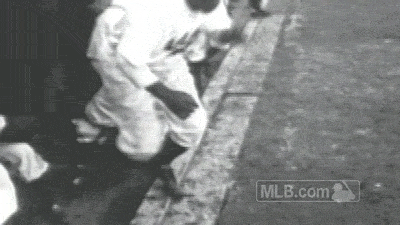It seems like every year, I see or hear someone question whether or not they should be celebrating Black History Month - mostly from non-Black people (but not always!). I wrote up something from my perspective that I plan on referencing the next time I get asked about it - and I hope it helps to answer that question…
One of my proudest moments of being a kid in elementary school was a project that I had in the 6th grade. The assignment was to write a report about an important and influential person in American History. Most of my classmates chose the usual suspects - Abraham Lincoln, Martin Luther King, Jr, Thomas Edison, etc. Me? Always wanting to be a little bit different, I wasn’t going to pick the same people that everyone always picked. I wanted to I choose someone different who, at the same time, was a personal hero of mine for as long as I can remember, and whose influence on American culture I personally think is very underrated - Jackie Robinson. Most people don’t know that baseball was my first love - before golf, basketball and video games! Growing up around 2 Grandfathers that were big baseball fans, who both lived in Brooklyn in the 40s/50s, and both loved the Brooklyn Dodgers, I heard many many stories about Jackie Robinson. Not only about Jackie being the first black man to break the color barrier in baseball, and American team sports, but the unbelievable odds that he overcame. Also, about the abuse that he faced from opposing players (including some of his own teammates), coaches, and fans who were resistant to the change, and the incredible courage and strength that he showed in the process. Jackie Robinson was everyone’s hero in the black community, and inspired a lot of people, even before the Civil Rights era had officially begun. By the way, he wasn’t only a hero in the black community since in 1947, he was voted the 2nd most admired man in the country - 2nd behind Bing Crosby. He was a man of incredible character, and many accomplishments, on and off the field, no question. I encourage you read up on Jackie. Or maybe I’ll have another post about him? Who knows? He also didn’t do it alone - he had help. An incredibly supportive wife, Rachel; Brooklyn Dodgers team owner and General Manager, Branch Rickey who was the driving force behind bringing Jackie to the majors; and most of his teammates and coaches who included him and helped him get acclimated to the major leagues.
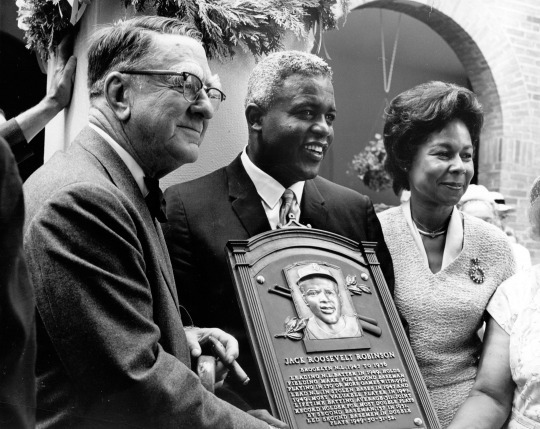
Branch Rickey, Jackie Robinson and his wife Rachel at his induction into the Baseball Hall of Fame. Cooperstown, NY 1962.
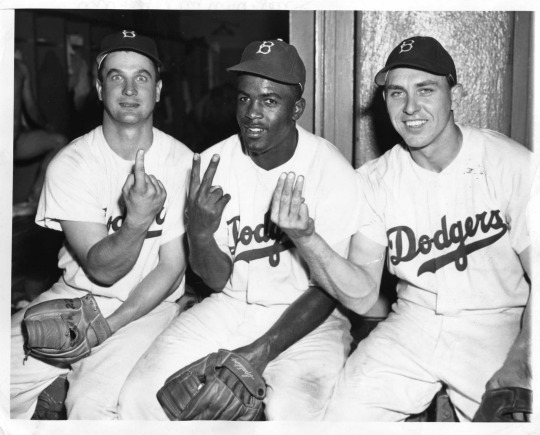
The funny part is that, initially, my teacher didn’t accept my topic since she didn’t think that Jackie Robinson was “important or influential enough” of a figure to be the subject of my paper. After telling my Mom about it, to say she wasn’t happy was an understatement. For those that don’t know, she rarely got upset - but when she did, it was an event - I knew my teacher was in for it! Long story short, she wrote my teacher a very stern letter letting her know that she needed to be more open minded. That my grandfather had written a book on Jackie Robinson that I would cite in my report, and that she hoped that she was open minded enough to not only listen to her plea, but also that she would probably learn something new. And that if she felt that he still wasn’t important enough to be the subject of my paper, I would turn in my paper early enough so that I’d have time to write another report on someone of her choosing if necessary. That was motivation enough to make sure this report was the best of the best!
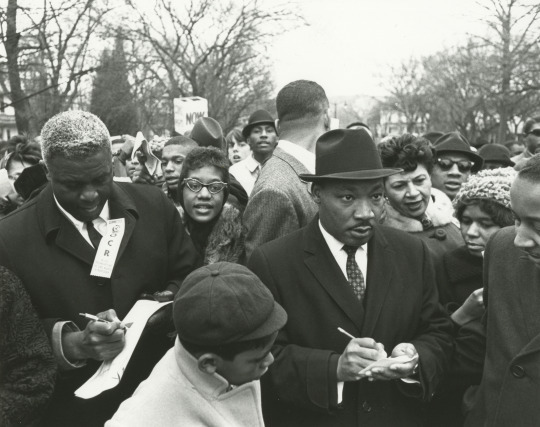
Jackie Robinson and Martin Luther King, Jr at the Civil Rights Freedom March in KY. 1964
The bottom line is that you cannot understate and underestimate the impact that Jackie Robinson had on American culture and American pop culture. One thing that I don’t think enough people talk about - there’s a direct correlation in America between the general acceptance of black people (or any people) on a large scale in American popular culture and prominent, incredibly talented, extraordinary, successful and honorable figures that broke down barriers and paved the way - not only in sports, but in many facets of life - politics, entertainment, and business to name a few. But sports, in particular, has always been one of the best ways to learn from and about people that you might not be exposed to otherwise - it brings out the best and worst in people - that’s what makes it so great. Even MLK said that Jackie was “a pilgrim that walked in the lonesome byways toward the high road of Freedom. He was a sit-inner before sit-ins, a freedom rider before freedom rides.” In sports, it started with Jackie Robinson (and even with the boxer Joe Louis and Olympian Jesse Owens around the same time). They broke down the door. Muhammad Ali, Willie Mays, Hank Aaron, Bill Russell, Jim Brown, Wilt Chamberlain and Kareem Abdul-Jabbar carried the torch, and navigated the impossible waters of the Civil Rights Movement…
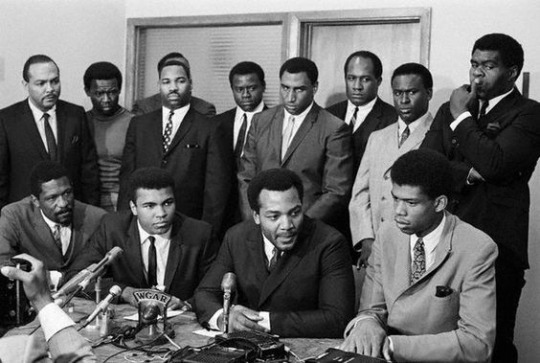
Bill Russell, Muhammad Ali, Jim Brown, Kareem Abdul-Jabbar (amongst others). June 1967, Cleveland, OH
Magic Johnson, Julius Erving, Michael Jordan and Tiger Woods moved the needle forward even more, not only as athletes, but as endorsers, spokesmen and larger than life figures in pop culture (TV, movies, magazines and all forms of media) that were bigger than the sports that they played. They weren’t perfect people, obviously, but they didn’t have to be. The foundation had already been laid at that point. That doesn’t just happen by accident. They took advantage of the fact that those before them had paved the way, and they managed to appeal to the masses not only because of their talent, but also their personality and charisma to come into people’s lives through various sources of media to become household names, and respected personalities.
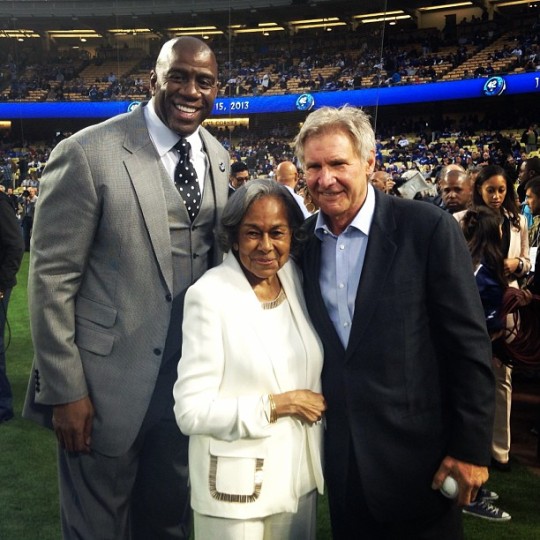
Magic Johnson, Rachel Robinson and Harrison Ford. Dodger Stadium. April 15, 2013 (Jackie Robinson Day)
You wouldn’t have all of that without Jackie walking through the door at Ebbets Field in Brooklyn on April 15, 1947. If he hadn’t walked that path with the grace that he had, it’s reasonable to think it could’ve been another 15-20 years before black people were accepted into team sports. Playing the “Back to the Future” game - if that timeline had shifted, maybe Black people would not have migrated North at the rate that they did in the late 40s and 50s? Maybe the Civil Rights Act wouldn’t have passed in 1964?… Maybe America wouldn’t have been ready for Barack Obama in 2008? Who knows? But it’s reasonable to think we could be living in a very different time. Or what if Jackie had been less honorable of a man? What if Muhammad Ali behaved like Mike Tyson? Or Barack Obama was involved in the same type of scandal as Nixon or Bill Clinton? How would that have shaped history? Interesting to think about.
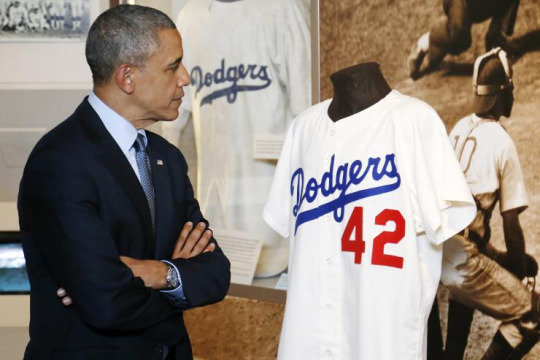
No matter who you are, if you’re part of any minority group, you have to be extraordinary to break down barriers and get to the next level of general popular acceptance. Not only do you need to be great at what you do, you also need to be outwardly a person of extraordinary character - it definitely helps to speed the acceptance process along. By doing that, it dramatically helps you to command the respect of those around you. You don’t need to be perfect, but always know that popular opinion is looking for any excuse to take you down or perpetuate an easy or lazy stereotype. You need to treat life like a sport… when you’re black (or any minority) in America, using a baseball analogy, you walk in the door being down 2-0 from the beginning of the game, or spotting the opposing team 8-10 points in a basketball game. This doesn’t only apply to black Americans, but also to women, Asian-Americans, Latinos, and white Americans in some situations - any walk of life where people of your ilk are underrepresented and/or stereotyped. It may not be fair, but life isn’t fair. Life is about overcoming challenges and adversity. Despite our current challenges, there’s no group of people who should be prouder of that history than Black Americans. I truly believe that.
My Mother’s father studied and has written numerous books on the African-American experience, while at the same time navigating his own racially based challenges during his life - especially during the Civil Rights era. My Father’s father lived the experience of growing up in the Jim Crow South, moving to NY in the 1940s, being the only black person in an all white company, and earning the respect of his peers that may not have initially wanted him there. Jackie Robinson, my grandparents, and numerous other people from that generation were great examples of exactly what we all need to keep in mind in the present day. It’s always important to be self-aware, knowing your surroundings, knowing what you do well, sharing those qualities with those around you and with the rest of the world - while at the same time handling yourself with integrity, honor and treating others around you with respect and helping others whenever you can. If you do that, there’s no guarantee that people will like you on a personal level (because you can’t really control that as hard as you might try), but they will almost always respect you for who you are, and what you do, and helps to shift the narrative. Acceptance and equality always starts with respect. In the words of Jackie Robinson “All I want for my children — and I think all you want for yours — is a fair and equal chance and respect for their dignity as human beings. Give us that and we’ll do the rest.” If people don’t like you, even after doing all of the above, that says much more about them than it does about you - any reasonable person can see that. And if we keep that in mind collectively, in the spirit of personal accountability and responsibility, think of how we can carry on the great work that has already been done by those that came before us and change the country for the better… and change the world. Whether on a large scale or a smaller scale, all of our jobs are equally as important. In the words of another great man and Civil Rights activist Mahatma Gandhi, “be the change that you want to see in the world.“ For all the great work done by the generations that navigated the pre-Civil Rights Era, they also didn’t do it alone. And it wasn’t just Black people that helped move things forward - it was the collective effort of a lot of people - minorities and majorities. You can’t overlook that.
The moral of the story is this - you don’t have to be Black to have an appreciation for Jackie Robinson. And you don’t have to be Black to have an appreciation for Black History Month. It’s about having odds stacked against you, and celebrating the progress that has been made - as well as the constant pursuit to overcome those odds. Not only that, but also having an annual reminder of the responsibility that we all have in our own way to realize the dreams that our predecessors had for us; reminding the younger generations about the vision we have for them, and the responsibility that we all have to carry on that mission. Chances are, that’s something that everyone can identify with at some level or another. So that is what Black History Month is all about to me. It’s about overcoming. It’s about inclusion. It’s about acceptance. It’s about EVERYONE.
But if you’re not about equality, inclusion and accepting other people, and don’t agree with anything I said above, and you still think that Black History Month is a waste of time and energy - all I can say to you is: ¯\_(ツ)_/¯
At least you only have to get through 28 days of it instead of 30 or 31! ;-)
Oh, back to my 6th grade report…. the best part? It wasn’t that I got an A+ on the paper. It was the fact that my teacher told me (and my parents) that she learned more from my paper on Jackie Robinson than she had on any other report in her time as a teacher. And she promised to be as open minded as possible to new ideas for as long as she was a teacher. My Parents and Grandparents THOROUGHLY enjoyed that. Mission accomplished!
P.S. Thank you Mom for always having my back, and knowing that I’ll always come through when it counts! :-)
